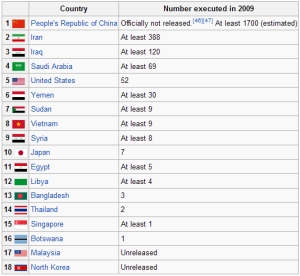This is from William Blum’s December 2011 post:
-o-
USrael and Iran
There’s no letup, is there? The preparation of the American mind, the world mind, for the next gala performance of D&D — Death and Destruction. The Bunker Buster bombs are now 30,000 pounds each one, six times as heavy as the previous delightful model..
But the Masters of War still want to be loved; they need for you to believe them when they say they have no choice, that Iran is the latest threat to life as we know it, no time to waste.
The preparation of minds was just as fervent before the invasion of Iraq in March 2003. And when it turned out that Iraq did not have any kind of arsenal of weapons of mass destruction (WMD) … well, our power elite found other justifications for the invasion, and didn’t look back. Some berated Iraq: “Why didn’t they tell us that? Did they want us to bomb them?”
In actuality, before the US invasion high Iraqi officials had stated clearly on repeated occasions that they had no such weapons. In August 2002, Iraqi Deputy Prime Minister Tariq Aziz told American newscaster Dan Rather on CBS: “We do not possess any nuclear or biological or chemical weapons.”1
In December, Aziz stated to Ted Koppel on ABC: “The fact is that we don’t have weapons of mass destruction. We don’t have chemical, biological, or nuclear weaponry.”2
Hussein himself told Rather in February 2003: “These missiles have been destroyed. There are no missiles that are contrary to the prescription of the United Nations [as to range] in Iraq. They are no longer there.”3
Moreover, Gen. Hussein Kamel, former head of Iraq’s secret weapons program, and a son-in-law of Saddam Hussein, told the UN in 1995 that Iraq had destroyed its banned missiles and chemical and biological weapons soon after the Persian Gulf War of 1991.4
There are yet other examples of Iraqi officials telling the world that the WMD were non-existent.
And if there were still any uncertainty remaining, last year Hans Blix, former chief United Nations weapons inspector, who led a doomed hunt for WMD in Iraq, told a British inquiry into the 2003 invasion that those who were “100 percent certain there were weapons of mass destruction” in Iraq turned out to have “less than zero percent knowledge” of where the purported hidden caches might be. He testified that he had warned British Prime Minister Tony Blair in a February 2003 meeting — as well as US Secretary of State Condoleezza Rice in separate talks — that Hussein might have no weapons of mass destruction.5
Those of who you don’t already have serious doubts about the American mainstream media’s knowledge and understanding of US foreign policy, should consider this: Despite the two revelations on Dan Rather’s CBS programs, and the other revelations noted above, in January 2008 we find CBS reporter Scott Pelley interviewing FBI agent George Piro, who had interviewed Saddam Hussein before he was executed:
PELLEY: And what did he tell you about how his weapons of mass destruction had been destroyed?
PIRO: He told me that most of the WMD had been destroyed by the U.N. inspectors in the ’90s, and those that hadn’t been destroyed by the inspectors were unilaterally destroyed by Iraq.
PELLEY: He had ordered them destroyed?
PIRO: Yes.
PELLEY: So why keep the secret? Why put your nation at risk? Why put your own life at risk to maintain this charade?6
The United States and Israel are preparing to attack Iran because of their alleged development of nuclear weapons, which Iran has denied on many occasions. Of the Iraqis who warned the United States that it was mistaken about the WMD — Saddam Hussein was executed, Tariq Aziz is awaiting execution. Which Iranian officials is USrael going to hang after their country is laid to waste?
Would it have mattered if the Bush administration had fully believed Iraq when it said it had no WMD? Probably not. There is ample evidence that Bush knew this to be the case, or at a minimum should have seriously suspected it; the same applies to Tony Blair. Saddam Hussein did not sufficiently appreciate just how psychopathic his two adversaries were. Bush was determined to vanquish Iraq, for the sake of Israel, for control of oil, and for expanding the empire with new bases, though in the end most of this didn’t work out as the empire expected; for some odd reason, it seems that the Iraqi people resented being bombed, invaded, occupied, demolished, and tortured.
But if Iran is in fact building nuclear weapons, we have to ask: Is there some international law that says that the US, the UK, Russia, China, Israel, France, Pakistan, and India are entitled to nuclear weapons, but Iran is not? If the United States had known that the Japanese had deliverable atomic bombs, would Hiroshima and Nagasaki have been destroyed? Israeli military historian, Martin van Creveld, has written: “The world has witnessed how the United States attacked Iraq for, as it turned out, no reason at all. Had the Iranians not tried to build nuclear weapons, they would be crazy.”7
It can not be repeated too often: The secret to understanding US foreign policy is that there is no secret. Principally, one must come to the realization that the United States strives to dominate the world. Once one understands that, much of the apparent confusion, contradiction, and ambiguity surrounding Washington’s policies fades away. Examine a map: Iran sits directly between two of the United States’ great obsessions — Iraq and Afghanistan … directly between two of the world’s greatest oil regions — the Persian Gulf and Caspian Sea areas … it’s part of the encirclement of the two leading potential threats to American world domination — Russia and China … Tehran will never be a client state or obedient poodle to Washington. How could any good, self-respecting Washington imperialist resist such a target? Bombs Away!





